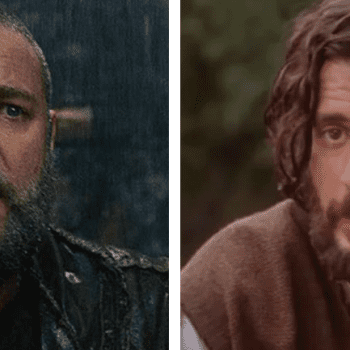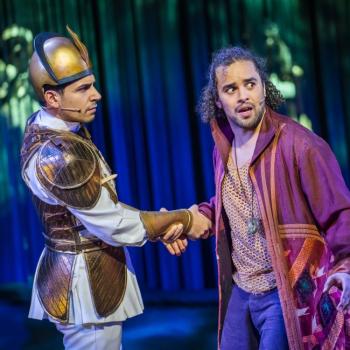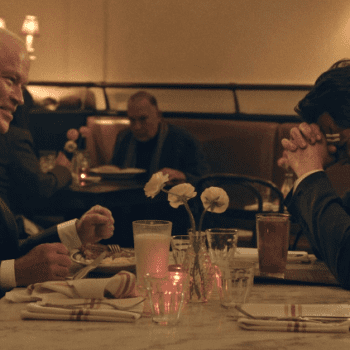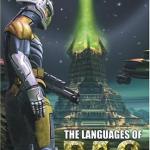My interviews with Darren Aronofsky: 1998 | 2014 pt 1 | 2014 pt 3 | 2014 pt 4
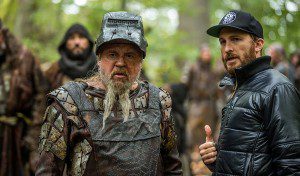 A few weeks ago, I had the privilege of seeing Darren Aronofsky’s Noah and speaking to both Aronofsky and his co-writer/co-producer Ari Handel immediately after the screening. The following is part two of our conversation. You can read part one here. The film comes out Thursday night.
A few weeks ago, I had the privilege of seeing Darren Aronofsky’s Noah and speaking to both Aronofsky and his co-writer/co-producer Ari Handel immediately after the screening. The following is part two of our conversation. You can read part one here. The film comes out Thursday night.
I’ve heard multiple times about the poem that you wrote, was that high school or is that late elementary, or–?
Darren Aronofsky: That was seventh grade, so I was like 12, 13, probably.
Okay. But I haven’t actually seen the poem itself anywhere, so are you going to release it, or is it one of those “it’s my childhood, keep it hidden” sort of things.
DA: It’s funny, because my kid came home talking about baseball cards, so I was like, “Oh, I think I have my old baseball cards in the basement,” so I started going through the old boxes, and I found in my baby book, my mom had a copy of the poem. This was like, maybe, seven months ago when I found it? Eight months ago? So I pulled it out and it was like an old mimeograph, that’s how old it was — scary!
Like those purple ink sort of things?
DA: No, no, it wasn’t that, actually it was an early Xerox. But with a couple of typos and stuff, because after I won the contest, I went home and I typed it because I had to read it at this thing. I didn’t find the actual original handwritten one, but that probably got sent off for this contest, so it’s probably gone. But we had it in the editing room on the wall, so I don’t know what I’m going to do with it yet. It’s a little embarrassing, but the funny thing is, it’s actually kind of got the same themes and ideas in it as the movie, right? (turns to Ari) That’s what you said.
Really?
DA: It was about peace. It was called ‘The Dove’, and it was about peace. It was about, you know, Mrs Fried said write something about peace, and it was about finding– I think it starts off about God wanted to destroy the world but then he found peace and love in the hearts of all men kind of thing, and that’s kind of what saved them.
In developing the script, you have the biblical text, obviously. What attention did you pay to other sources, like the Book of Enoch or other sources like that?
DA: You want to talk about that, Ari?
Ari Handel: Yeah, we read a lot. We read a lot. We read Enoch, we read Jubilees, we read a lot of midrash, we read a lot of–
DA: Dead Sea Scroll fragments.
AH: –different legends, and in midrashic tradition, there are tons of, in many cases, competing stories and legends and ideas circulating. So we read a lot of that stuff and drew off things.
And my understanding is that in some of those stories they actually explore the idea that God might have wanted to wipe out everybody, including Noah.
AH: I don’t remember seeing that so specifically, but you know, almost every idea you can imagine is floated, because they’re all debated and thought out, and so certainly, the righteousness of Noah and what that means is something that people have thought about a lot.
DA: There’s that one line, he’s “righteous in his generation.”
AH: And a lot of people have said things like, you know, compared to some prophets of later generations, he would not have been righteous. Particularly, like, Abraham, they say, Jesus too I would imagine.
DA: Well definitely Jesus. But they talk about Abraham, who pled with God. He said let me go and try to save humanity.
AH: He said, “Don’t, don’t, what if there were ten thousand good men? What if there are one thousand?” But Noah didn’t say, “God, don’t.” Noah just built the boat. So it’s not that he was a bad man, but where was the mercy in that? Whereas Abraham was mercy. So all these ideas are actually– A lot of people have been exploring them, to try to make sense of the tale. So we tried to read everything we could.
That’s interesting.
DA: Is it okay that we’re getting so theological?
Absolutely! Absolutely!
DA: I’m just, is it helpful for your readers?
I love it!
DA: Oh good. Well for me, I can’t point to a specific thing that we stumbled on that reflects that, but what I think intrigued me and Ari was that it’s kind of the fourth story in the Bible. You have creation, you have original sin, you have the first murder, and then it jumps forward and then suddenly everything’s terrible, and God wants to start over again. But what was clear to us was that Noah is a descendant of the original sin. There’s three sons, and he’s a descendant of Seth, so his ancestors are Adam and Eve, so he has that inside him, so there’s this weird kind of question mark that brought to us, like why restart again if that possibility is still there? Man still has that possibility of being tempted.
AH: Especially because you can then flip the page– You finish reading Noah and all the wicked people have been wiped out, and there’s this one family that’s survived, and you flip the page and it’s Babel. So it just immediately raises the question of, what does that mean? If you look at the context of the story within the Bible, what is that trying to say about the place of sinfulness and wickedness within us? And we felt like that was what we have to explore, is like, y’know, not the good guys and the bad guys but the good and the bad within us.
DA: Yes.
So the idea that Noah was righteous in his generation is kind of a way of saying the bar was set really low back then?
DA: No, I don’t agree with that. I don’t agree with that. I think Noah is an incredible, an incredible figure, and is a prophet alongside all the prophets. But I think that was just– People talked about that because there is that weird writing, when they say “righteous amongst his generation,” and people have interpreted that in a way–
But I think for me, he is tested, and goes through the most difficult test possible, and he comes out the other end with the way God wanted him to sort of succeed, and I think that, you know, within that mythology, that’s the way we decided to perceive it, that there’s this long line of people being tested with their faith, and either they succeed or they don’t. And Noah definitely succeeds.
AH: By the end of the film, Methuselah says he chose you for a reason. For us, that reason was — and this relates to his righteousness — of all the people, Noah was the one who was able to understand, really understand, God’s wrath, and also the one who was able to find the mercy, God’s mercy. Not because he didn’t want to die, not because he was scared, but find it for the righteous reasons, and that’s what makes him righteous, is he’s able to go through that and find the worth of mankind, with full knowledge of also the sin of mankind, and find that balance.
Just curious about possible input from other traditions. Whenever I heard a bit of casting news, I always had to Google the names, because I didn’t recognize all the character names, so when I heard that Emma Watson was playing Ila, I looked it up and came across a Hindu tradition that Manu is the name of basically the Hindu Noah, he’s the one who survives the Flood in the Hindu tradition, and Manu has a son or a daughter or both — it varies — a gender-switching child whose name is Ila. So were you aware of that?
DA: We had no idea.
Honestly?
DA: (to Ari) Did you know?
AH: I did not.
DA: That’s awesome.
You didn’t know that?
DA: No, we named her Ila because our college roommate has a daughter named Ila, and it means “Light” in Hebrew, and we liked it, and we were looking for a name–
AH: We were looking for a name that had a sort of biblical simplicity to it but you hadn’t heard before, it’s a new character.
Wow. Really?
DA: Yeah. That’s great. That’s great.
AH: I’m a little upset that I didn’t–
DA: That we didn’t stumble on that. It’s spelled the same way, I-L-A, in English, do you know?
Well that’s how I found it, on Wikipedia.
DA: Hmmm. I’m surprised we’ve never found it. We did a lot of research into all the Flood stories. We read them all.
It would have made perfect sense to me, because obviously if everyone is descended from Noah’s family–
DA: Yeah, we didn’t make that connection. It would have been something.
And also, of course, the fact that Tubal-Cain is in the film. Now originally his name is Akkad in that earlier script, and I don’t know if you know this, but the map of the Ark that appeared on the Entertainment Weekly website actually has a little thing in one spot that says [spoiler redacted].
DA: I think we changed it just– I remember I was unhappy because it wasn’t biblically correct, because we got the name Akkad from later on in the Bible.
AH: This is what we did. In all honesty, it was a placeholder name, and we just looked for a name that has a certain– just for the sound. And then when we got down to it, we had to find a character who was biblical as best as we can–
DA: And then we looked at it. I think we had the name Tubal-Cain early, but I was a little nervous because–
AH: Because of the Cain aspect of it. It was too strong, or would people believe– People who don’t know the Bible, would they actually, you know–
DA: We were like, you can’t use Cain, because then people might confuse it for being Cain and it’s the wrong generation, so we were like, we can’t use that.
But then I remember going back to the Bible and calling up Ari one night in the middle of the night and going, “Tubal-Cain is a contemporary of Noah. They’re both at the end of their lines” — Tubal-Cain’s line ends there, but Noah’s line goes on — and I was like, “He’s a forger of metal and weapons. It’s perfect. Like, the first blacksmith.” And their whole costumes came out of that design.
So once again that was taking something that was in the Bible as a small thing, and trying to expand it into this– taking this blacksmith type of aesthetic and turning it into kind of a military thing, and that’s where Michael Wilkinson, our costume designer, kind of went with it, because of something we found there in the Bible.
Genesis 4 also says that Tubal-Cain’s sister was Naamah and some traditions say it was the same Naamah that Noah was married to.
AH: Yeah, and then other traditions say it’s definitely a different one. We used that name because that was the most often referenced name we could find for Noah’s wife–
DA: And I also think it’s also in the Muslim tradition, they use Naamah, don’t they?
AH: I think it might be Emzara.
DA: They might use Emzara. There’s two names that were out there that we had to choose from.
AH: So there are a lot of sources saying it couldn’t be the same one, and I’m sure the reason for that is because, wait a second, if she’s Tubal-Cain’s sister then that means she’s from the Cain line, then we probably don’t really want her on the boat. But as you know, if you’ve memorized those trees, a lot of those names show up on both sets. The names are getting multiply used.
Yes. I memorized the Genesis 5 one because that’s the one that lasts, I didn’t memorize the Genesis 4 one.
DA: You’re a bold man. That’s a hard thing to do. I’ve watched the film three– y’know, thousands of times now, and I still can’t do that line of names. And neither could the actor. (laughs) It was hard. “Mahalalel” — that’s a hard one.
I actually didn’t stop at Genesis 5, I actually memorized the family tree from Adam all the way down to the kings of Judah.
DA: Oh wow. You should come by the Noah art show, by the way, if you’re here next week.
No, I’m from Vancouver.
DA: That’s too bad. There’s this one piece that’s beautiful, a Ward Shelly piece that I tweeted today, it’s an amazing piece, but they kind of track all the different family lines and trees all the way from Adam to Jesus and David and everything, it was really cool.
I drew a chart like that when I was a kid but it didn’t have so many leaves.
DA: Oh really? (laughs) There you go.
Another question about the development of the script. When Paramount announced the film a couple years ago, they mentioned that John Logan was coming on, but when I saw the trailers a few months ago, I noticed that his name wasn’t in the credits.
DA: It’s a long process where the Writers Guild makes a decision on who actually did it. He was really good for us, he took that script that you read and was very much like a producer, he came on and showed how to make things better and more clever and a little bit sharper. He kind of freed us up to let certain things go that probably made it clunkier, and he made it just a better script, I think. He was just like a great writing coach. But ultimately then, the WGA looks at all the drafts and they say who did most of the writing. And to be honest, he did most of the writing, because I was off directing for the last few drafts, that was all him.
Come back tomorrow for part three of this exclusive four-part interview.




